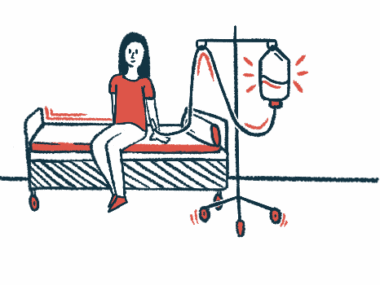AIHA patients on rituximab see high risk of infection, hospitalization
Almost 18% of patients in study hospitalized within months of infusion
Written by |

Nearly 18% of people with autoimmune hemolytic anemia (AIHA), of which cold agglutinin disease (CAD) is one type, were hospitalized due to an infection within six months of their first rituximab infusion, according to a French study.
Patients particularly at risk for infection-related hospitalizations were those older than 70 and those who were also being treated with steroid medications.
The findings highlight the importance of preventive measures, including vaccines, in AIHA patients being treated with medications that may suppress their immune systems, the researchers wrote.
The study, “Risk of hospitalization with infection in adults with primary AIHA treated with rituximab: a French nationwide study,” was published in Blood Advances.
AIHA refers to a group of diseases in which the immune system mistakenly attacks and destroys otherwise healthy red blood cells. Primary AIHA is when the disease happens without a known cause (such as cancer or infection).
Risk of infection
CAD is a form of AIHA caused by self-reactive antibodies known as cold agglutinins, which attack red blood cells at cold temperatures. Other forms of AIHA involve antibodies activated at warmer temperatures.
People with primary AIHA have compromised immune systems and are at an increased risk of infection relative to the general population, and these infections may be severe or require hospitalization. This risk may be even greater among people taking immune-suppressing medications.
AIHA is often treated off label with rituximab, a therapy that aims to deplete B-cells, the immune cells primarily responsible for producing antibodies. This is expected to reduce the self-reactive antibodies that cause the disease.
However, B-cells also produce many antibodies the body needs to fight infection and illness. Rituximab, therefore, could further increase the infection risk in AIHA patients.
Patients using rituximab along with corticosteroids, which are also strong immunosuppressants, may be at a particular risk of infection with opportunistic pathogens, microbes that don’t usually cause illness in healthy people but which take advantage and cause serious infection in people with compromised immune systems.
For the study, a team of scientists in France sought to examine the real-world risk of hospitalization due to infections among 959 adults with primary AIHA who were diagnosed and treated with rituximab between 2012 and 2018. The patients, with a mean age of 67, came from the French National Health Database. Women made up 60.5% of the total.
Overall, 17.6% of patients — 169 people — were hospitalized for infection in the six months after receiving their first infusion of rituximab. Hospitalization occurred a median of 43 days after the infusion, and hospital stays were a median of 10 days long.
Most often, infections involved the lungs (40.2%), followed by the urogenital region (16%), and gastrointestinal tract (12.4%).
Some people had multiple hospitalizations for infection. Thirty-three people were hospitalized twice, 12 people had three incidents, six people had four incidents, and one person was hospitalized seven times.
Opportunistic infections occurred in 28 people (16.6%), including 14 cases of pneumocytosis, a type of invasive fungal infection that causes serious lung symptoms. All cases of pneumocytosis happened in people who were also being treated with corticosteroids and hadn’t received preventive treatment against pneumocytosis. Most were also women aged 70 or older.
Patients with pneumocytosis were hospitalized a median of about two months after their first rituximab infusion, and 28.6% of them died within a month of hospital admission.
In statistical analyses concerning all patients, an age of at least 70 years and corticosteroid use were significantly associated with hospitalization due to infection.
Across all 959 people included in the study, 87 people (9.1%) died within six months of their first rituximab infusion. Among the 169 people who were hospitalized, 12.5% died in the month after their hospital admission.
Overall, “while the efficacy of rituximab in the setting of AIHA … is high and well-established, the incidence of hospitalizations with infection and the subsequent mortality are high in adult patients with primary AIHA treated with rituximab,” the researchers wrote.
Notably, rates of vaccinations in the population were relatively low at the time of starting rituximab. Fewer than a quarter had been vaccinated against pneumococcus (a bacterial cause of pneumonia) in the preceding five years, and little over a third had received a recent flu vaccine.
The researchers wrote that vaccination against pneumonia and other seasonal viral infections “should be strongly encouraged in patients with AIHA who require rituximab,” as should preventive treatment against pneumocytosis in older patients using steroids.






